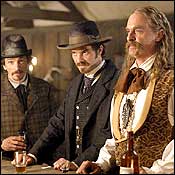
At the end of the fourth hour of Deadwood (Sundays, starting March 21; 10 to 11 p.m.; HBO), someone important is shot in the back and dies at a poker table. Among more than a dozen characters, this is the one I’d enjoyed the most so far in David Milch’s gothic Western. His passing vexes. Hard as it may be to imagine eight more hours without him, it is harder still to write a review around his subtraction, to save the unpleasant surprise. But Deadwood doesn’t care. Deadwood, somewhere between Casablanca and No Exit, is Hobbesian. Even when they’re tall or fat, these claims jumpers, real-estate swindlers, road agents, opium addicts, and saloon girls are nasty, brutish, and short.
The time is 1876. The place is the Dakota territory, whose black hills were deeded by treaty to the Sioux. But a gold strike has changed the white man’s mind, and Custer’s getting his subscription canceled at Little Big Horn is a terrific excuse for Lebensraum. What lawless Deadwood counts on, after the extermination of the savages, is squatters’ rights. Meanwhile, Ian McShane, a monster of primitive accumulation, owns one saloon and brothel as well as most of Main Street. Powers Boothe, with more talcum powder, owns another, with a fancier casino and meat inspection for the whores. Upstairs at William Sanderson’s seedy hotel, lovely Molly Parker is hitting the laudanum bottle hard. On the same floor, Keith Carradine’s Wild Bill Hickock and Robin Weigert’s Calamity Jane try to protect an “orphan squarehead” from road agents who murdered the rest of her family. Down the muddy block, wanting to start a hardware store, are the newly arrived Dudley Do-Rights, the handsome but hot-tempered Timothy Olyphant and his kinder, gentler, worldly-wise partner, John Hawkes. I haven’t mentioned Brad Dourif, Kim Dickens, Jeffrey Jones, Paula Malcomson, W. Earl Brown, or the pigs. The pigs are important because they eat the corpses.
“From Homer and the Bible to John Ford, men are hanged, women raped, and children stolen by savages because of turf wars.”
From Homer and the Bible to John Ford, men are hanged, women raped, and children stolen by savages because of turf wars, sexual property rights, and different ideas on how to look good dying. Sometimes, too, a sheep is dipped. Not even Deadwood fiddles with this Western formula. But actors always make a difference. And here, even though they mostly look like pigs, they are spectacular.
Touching Evil (Fridays; 10 to 11 p.m.; USA) should feel familiar. It borrows entire plotlines from the British series with the same name. As the newly formed rapid-response Organized and Serial Crime Unit of the FBI pursued a child abductor in last week’s two-hour pilot all over the city and into the dreams of a troubled dimwit, we knew we were headed to a special storage space. But in London, nobody had psychic and/or superpowers. Whereas in San Francisco, after a near-fatal gunshot wound, special agent David Creegan (Jeffrey Donovan) comes back from the dead both fearless and shameless, with a rude sense of humor and a compass in his head that points to dark poles. No wonder his oglesome partner in high-speed detection, Susan Branca (Vera Farmiga), keeps looking at him as if he were either an alien or a Mulder. This Americanization of Evil is still a work in progress, but Bruce Willis is onboard as an executive producer and so are the Hughes brothers, Allen and Albert (Menace II Society and From Hell), with Allen also directing.
I liked the first two hours of The D.A. (Fridays, starting March 19; 10 to 11 p.m.; ABC). But watch it quick. It’s another well-done dramatic series on ABC, which means they’re likely to cancel it, like Karen Sisco, before it has a chance to find an audience. But Steven Weber is persuasive as the L.A. D.A., for whom politics is the normal respiration of intelligence. And so is Bruno Campos, as the son of a slain congressman and the only investigator Weber can trust since the rest of the office is trying to sabotage him with the cops and media. And there are enough twists to the corkscrew plots—just how did the Russian mob find out where a “protected witness” was stashed? Who killed the sitcom star if it wasn’t Felicity Huffman’s client or a conspiracy of abused wives?—to keep the brain in a swivel.
Significant Others (Tuesdays; 9 to 9:30 p.m.; Bravo) is a semi-improvised sitcom about recently wed couples seeing a marriage counselor, to whom they explain their problems with pregnancy, promiscuity, unemployment, in-laws, and body odor, as if to a priest at confession or a camera on a reality show. As Mark Twain said of Wagner’s music, it’s better than it sounds. Not so, I’m sorry to say, The Stones (Wednesdays; 9:30 to 10 p.m.; CBS), in which Judith Light and Robert Klein announce their impending divorce to their grown children at their 25th-anniversary party. These children, slacker princess Lindsay Sloane and science nerd Jay Baruchel, nevertheless live at home, as if in Belfast with a laugh track. And the worst of the new mid-season series is The Help (Fridays; 9:30 to 10 p.m.; WB), where the rich and lazy Ridgeways lord it over their wisecracking servants in some Southern California notion of a feudal estate. The best joke in the pilot is about “bubble rap”—that is, rap music about getting your nails done.
Going to the Mat (March 19; 8 to 10 p.m.; Disney) suggests that Andrew Lawrence from New York will fit in better at his new Utah high school by joining the wrestling team than by playing the guitar and drums. With Khleo Thomas, D. B. Sweeney, and Wayne Brady.
The New Americans (March 29 and 30, 9 to 11 p.m.; March 31, 9 p.m. to midnight; Channel 13) follows immigrants from Nigeria, the Dominican Republic, the Palestinian territories, Mexico, and India, quite as if the Statue of Liberty stood up for them, too.